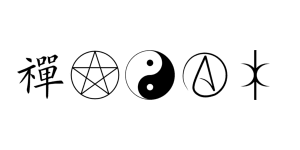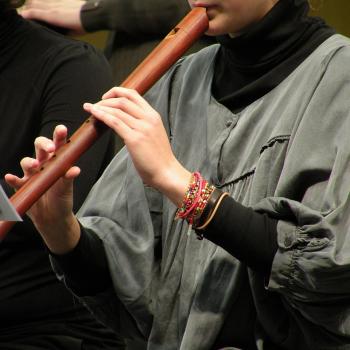“I am of all faiths in my fashion.” — Morpheus, in Neil Gaiman’s “Sandman: Ramadan”
‘When I use a word,’ Humpty Dumpty said in rather a scornful tone, ‘it means just what I choose it to mean—neither more nor less.’ — Through the Looking-Glass, Lewis Carroll
Part of the fun of being on an eclectic self-defined path is getting to continually re-define it. Thus as I consider Patheos’s latest writing prompt, “Why I Am Still a ______,” and I focus on that word “still”, I have to ask myself, “Does being a Zen Pagan Taoist Atheist Discordian still mean the same thing to me it did when I first used that phrase?”
(Sometimes I throw “Transcendentalist” into that mix too, to claim some allegiance with Emerson, Thoreau, and Whitman, but five philosophies are enough to consider in one blog post.)
I see in my archives that I was calling myself a “Zen/Pagan/Taoist/Atheist” at least as far back as 1994. Sometime between then and 2000 I found the good news about Eris Discordia (though she had found me long before then) and added the “Discordian” bit. In 2000 I wrote:
Zen Pagan Taoist Atheist Discordian? These are the main spiritual influences I draw on. To take them one at a time:
Zen: Zen Buddhism, of course. A set of philosophies and techniques for understanding how our minds work, how we cause our own suffering though our desires and through trying to hold fast to a world of illusions, and how to end that suffering.
Pagan: nature-based spirituality. Modern Paganism is an effort to revive useful ancient mythological and shamanistic ideas and practices. I wrote something that explains my view of it at [dead url].
Taoist: the ancient (c. 2500 years old) Chinese philosophy of harmonizing with nature. Taoism is in some ways an ancestor of Zen Buddhism: Indian Buddhism + Chinese Taoism = Ch’an Buddhism, which went to Japan and became Zen. (Zen and Ch’an are the Japanese and Chinese words for “meditation”) Taoism’s seminal work is the “Tao Te Ching”, of which there are many translations, some of which you can find online.
Atheist: given most people’s definitions of a god as some supernatural being outside the physical universe, I’ll take the atheist label. Given other definitions, I’ll take other labels: pantheist (“Everything is god”), autotheist (“I am god”), apatheist (“I don’t care about gods”), whatever.
Discordian: If there _are_ any gods or goddesses, obviously the one in charge of this universe is the Goddess of Chaos, known to the Greeks as Eris and to the Romans as Discordia. Discordianism is a faith of salvation though nonsense, that holds to the truth that “The human race will begin solving it’s problems on the day that it ceases taking itself so seriously.” The _Principia Discordia_ is a mixture of juvenile humor and deep philosophical truth; an online version can be found at [dead url — try http://pricipiadiscordia.com].
I look back at this after fifteen years, and it’s not terrible. I’ve come to deeper and more nuanced understandings of each of these points, but nothing that makes me disavow this explanation.
So then, what are those deeper and more nuanced understandings? What have I found that makes me keep each of these elements as a part of my well-balanced spiritual practice, and recommend them to others?
- My Zen, such as it is, is mostly Karate Zen, the moving mediation of the martial arts. But I’ve managed to make good old zazen (seated mediation) part of it too, and I’ve come to see the truth of the old saying “Ken Zen Ichi Nyo” — the fist and Zen are one, or the sword and Zen are one, depending on how it’s written. (It’s a random coincidence, but one that we karate folks get some mileage out of, that in Japanese there is a word pronounced “ken” that means sword and also a different word pronounced “ken” that means “fist”.)
When I sit without a goal, or when I try to put my whole self into the movements of a kata, in either case not trying to make anything in my mind, still my brain goes on making things, spinning fantasies and fears that have nothing to do with the actual situation of the moment. Seeing how it does this, bearing witness to the mind, seeing a bit behind the scenes of the self-trickery (or perhaps I should say, the trickery that creates the “self”), the illusion grows a little less captivating, the “thus-ness” of things becomes a little clearer, and life is a little less out-of-joint.
- In writing Why Buddha Touched the EarthI researched the history of Paganism going back to the Greco-Roman revival in European art in the late 18th century and the Romantic movement of the 19th. I’ve come to see Neo paganismas part of the reaction to industrialization and the destruction of the natural world…and the need for such a reaction has certainly not decreased. I’ve only become more convinced that we need a spirituality that honors nature, both in the sense of the natural world of forests and oceans and rock and air and in the sense of our own deepmost human nature, untamed by civilization.
I’ve done ritual with Wiccans (of several stripes), Druids (ADF and OBOD), Voodoo folks, Church of All Worlds members, and uncategorizable eclectic Pagans like and yet unlike myself. I’ve visited Shinto shrines, hiked up a holy mountain, danced all night around bonfires, led rituals with scores of participants, had a few mystical experiences (some catalyzed by strange chemicals, some not), and felt the liminal presence of the transpersonal in ways that sometimes seem completely transcendent and sometimes to have person-like characteristics. (Most notably, a sense of humor!) And I’ve only become more convinced that we need a spirituality that honors the fact that our minds can enter different states of consciousness, that values multiple perspectives and that cultivates techniques for moving between them — magic, in a word.
- I’ve become a bit more familiar with Taoist philosophy through my studies of Chinese medicine. I’ve learned to think in terms of yin and yang, an important way of understanding the world. Western philosophy can be dangerously stuck in exclusive thinking — that there is only one ultimate and final truth, that either A or not-A must be the case; while Taoism right at the root has two opposing yet interdependent principles. Many great perplexities — free will versus determinism, individual vs. community, physicalism versus idealism, freedom versus security — evaporate when considered as example of the Taoist yin/yang principle.
- A species with atomic bombs and the ability to wreck its planet’s biosphere cannot afford superstition or supernaturalism, or to hold on to ancient religious dogmas backed by nothing but priestly authority. My understanding of what it means for the gods to exist or not exist has gotten more philosophically sophisticated, and I find some of what’s coming from the “New Atheists” distressing (especially the Islamophobia); but given the usual naive “man on the street” ideas of what constitutes “deity” and “existence” I still have no hesitation in identifying as an atheist.
- And if there’s one thing we’re definitely going to need if the species is going to make it through the next century or so, Goddess knows it’s a sense of humor, an appreciation for the fundamental ridiculousness of all things.
More than that, following a trickster (or perhaps more accurately, being claimed by one) has taught me about the nature of story and narrative, how stories can define us if we’re not careful. Everyone who’s well-educated knows the story of the golden apple; most have thought Eris to blame for the war started by the rivalry of Hera, Athena, and Aphrodite; few have considered just who the prettiest one at any wedding is and truly understood the story.
I’ve also found the Discordian Law of Fives to a truly great insight into the nature of reality. (Yes, really.) According to the Principia Discordia:
The Law of Fives states simply that: ALL THINGS HAPPEN IN FIVES, OR ARE DIVISIBLE BY OR ARE MULTIPLES OF FIVE, OR ARE SOMEHOW DIRECTLY OR INDIRECTLY APPROPRIATE TO 5.
The Law of Fives is never wrong.
In the Erisian Archives is an old memo from Omar to Mal-2: “I find the Law of Fives to be more and more manifest the harder I look.”
And so it goes for any magical, religious, philosophical, or political principle you adopt: the harder you look, the more you will find it.
So I might say, truthfully, that I find Zen Pagan Taoist Atheist Discordianism to be more and more manifest the harder I look.
You can keep up with “The Zen Pagan” by subscribing via RSS or e-mail.
If you do Facebook, you might choose to join a group on “Zen Paganism” I’ve set up there. And don’t forget to “like” Patheos Pagan and/or The Zen Pagan over there,
too.


















